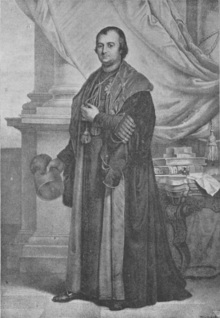Pierre François Xavier de Ram

Pierre François Xavier de Ram (September 2, 1804, Leuven - May 14, 1865, Leuven), was a Belgian churchman, and historian, best known for being the first rector of the new Catholic University of Mechlin (1834) and then of the new Catholic University of Leuven (1835).
Biography
De Ram entered the seminary at Mechelen, where he was ordained in 1827. He was appointed professor of poetry at the seminary of Mechelen and archivist of the diocese.
During the period when King William I was carrying on his campaign against the Catholic faith and traditions of the Belgians, and while de Ram was still young, he took an active part in the struggle maintained by the Belgian clergy against the government of the Netherlands, republishing eighteenth century works, in which, in a series of historical studies refuting the doctrines of Joseph II, he combatted the latter's disciple, King William I.
He was next appointed keeper of the diocesan records and professor in the episcopal seminary at Mechelen. In order to stay the spread of Protestantism in the Netherlands he collaborated with a movement for the publishing of religious works, bringing out Levens von de voornaemste Heyligen en roemweerdige peersonen der Nederlanden (Lives of the most prominent saints and celebrities of the Netherlands). His chief study for many years was hagiography, and he published an edition of Butler's Lives of the Saints (Leuven, 1828–35). Between 1828 and 1858 appeared the Synodicon Belgicum, a collection of unpublished documents upon the ecclesiastical history of the Netherlands since Philip II (Leuven, 4 vols., in quarto).
During the years immediately before the Revolution of 1830, de Ram, who was much influenced by Lamennais, was active in bringing about a coalition of Liberals and Catholics against the Dutch government established by the Powers on the fall of Napoleon, and in endeavoring to give a democratic character to the policy of his church. He declined to stand as a member of the Belgian assembly, and applied himself wholly to teaching and to editing or composing historical books.
De Ram was an active member of the Royal Academies for Science and the Arts of Belgium and a foreign associate of the Bavarian Academy of Sciences and Humanities. When the monumental project of the Acta Sanctorum, interrupted in 1794, was resumed by the so-called New Bollandists in 1838, De Ram, who as a young man had bought the whole corpus - to this time 53 volumes in folio - and who himself was considered as a possible member of the board of editors,[1] gave his expert opinion to the Commission royale d’histoire of the Royal Academy recommending warmthly the prosecution of the much discussed project.[2] As professor of philosophy at Mechelen he succeeded in bringing about the foundation of a local catholic university in 1834, which was transferred to Leuven in 1835, thus re-establishing the Catholic University of Leuven. He was rector of the university till his death in 1865.
References
- ↑ The copy of De Ram’s Acta Sanctorum, whose library was sold after his death in 1865, first came to the Fürstlich Fürstenbergische Hofbibliothek Donaueschingen, which was sold in 1999. Now De Rams copy is in private ownership in the South of Germany.
- ↑ Pierre François Xavier De Ram, Les nouveaux Bollandistes. Rapport fait a la Commission royale d’histoire. Hayez, Bruxelles 1860 (also in: Bulletins de la Commission royale d’histoire, 3. série, Bd. II 1, 1860.)
 This article incorporates text from a publication now in the public domain: Herbermann, Charles, ed. (1913). "article name needed". Catholic Encyclopedia. New York: Robert Appleton.
This article incorporates text from a publication now in the public domain: Herbermann, Charles, ed. (1913). "article name needed". Catholic Encyclopedia. New York: Robert Appleton. This article incorporates text from a publication now in the public domain: Chisholm, Hugh, ed. (1911). "article name needed". Encyclopædia Britannica (11th ed.). Cambridge University Press.
This article incorporates text from a publication now in the public domain: Chisholm, Hugh, ed. (1911). "article name needed". Encyclopædia Britannica (11th ed.). Cambridge University Press.